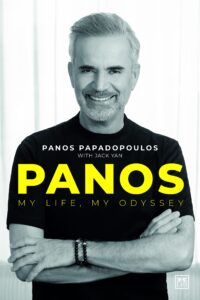|
Going From Rags To Riches by Panos Papadopoulos
By Guest Contributor Panos Papadopoulos, Author of PANOS: My Life, My Odyssey
If there was a formula on how to get from rags to riches, we’d all do it. The truth is a little more complicated, but the lessons are probably universal.
You have to start with the feeling that things could be better. As a child, I felt a real sense of injustice over our family’s financial status. Leaving poverty was a firm dream, for poverty equalled endless torment.
Secondly, you need a decent sense of values.“Even if you are poor,” my father would tell my two siblings and me, “you are rich enough to be clean.” He would check that we had washed our feet, and inspect our shoes every morning.
“Be proud of what you are and what you have,” both my parents would say. “If you have kindness, then you are a good person.” We also learned to be tolerant of others. If you borrowed something, you returned it on time. Mind you, one thing my parents never had to tell me was to be on time, because I always was. Those little things all added up.
I’ve worked since I was a child. On Sundays, my mother had an extra job cleaning the office at the factory where she worked during the week, and I’d help out, scrubbing the floor. I was five years old.
Working was always a pleasure. It helped me grow. No matter what I did, I wanted to do it better than everyone else.
I knew that I couldn’t make it in Greece in the 1970s. I was making reasonable money at the factory and had a side gig selling insurance. I was on my way out of the working class. But corruption reared its ugly head in many areas of life: workers’ rights, pollution, even education, where I discovered students could bribe an examiner to get good grades.
You have to take the chances presented to you. Walking around Athens, I spied ‘Interrail card, only $100’ on a sign at a travel agency. I decided to buy it.
The train would pass through Sweden, a country I knew a little about. Stopping in Gothenburg, I enquired at the university to see if I could study there. Thanks to the university principal, who, unlike her Greek equivalent saw me personally, my mind was made up. I would return to Sweden to study.
I took what jobs I could in Sweden: working in kitchens, washing dishes, writing as a foreign correspondent for a Greek newspaper, working as a guard in one of Gothenburg’s toughest prisons and then as a parole officer, doing night work in a halfway house, then a psychiatric hospital and a retirement home, and substitute teaching. I learned about society and how it ticked.
I studied engineering but it wasn’t what I really wanted. I changed my major to behavioural science. In my postgraduate work, I examined nightlife at the disco and the importance of clothing. It proved to be a success, as my thesis quickly generated media interest. I even wound up on the front page of one of the biggest newspapers in Sweden! Prime-time TV followed.
Not only was my subject interesting, but it stirred my passion.
Most of my jobs were never enough to stimulate my mind, my soul, my sense of self. I loved to learn new things. I always took the harder path, because it stimulated my creativity and made me happy. I’m a born fighter and I would get bored quickly if my life wasn’t full of rich possibilities and tough challenges. Maybe I need to prove to myself how good I can be.
No risks, no history.
To decide to start a swimwear brand in a very cold country with barely any summer might have seemed like commercial suicide. Rationally, it probably was. But, that was the challenge. I was a born entrepreneur acting with my heart and passion. I must have innately analysed everything already, and the answers were deep in my soul. The way to uncover them was to do it. So often in my life, I would act first, and the realizations would then come.
It pays to remember that doing your own thing — going on your own journey — is one of the most important ingredients in success. And that’s true not just in business, but in everything.
I saw how colourless and drab the swimwear was in Sweden at the time, and I began planning how to inject some colour on to the beaches. I had no knowledge or experience in this area, or anyone I could ask. There was no internet I could turn to for research.
A year later, my small collection took shape, but not before I did plenty of sociological market research. There was no room for failure. I couldn’t have something with a success rate of 75%. I didn’t have the money to risk. It had to be 100% successful and achieve great acclaim. There was no other option. I spoke with as many women of different ages as I could, asking what they felt was missing, or what disappointed them when it came to swimwear.
I learned every stage of production, as well as the ins and outs of business. I took courses in the first three years to get up to speed. I aimed to have consumers who were beyond satisfied — thrilled with the product and happy about everything that came with the brand, so they could do word-of-mouth marketing for me. I did not have resources for a traditional marketing campaign, so my products were the only means through which I could market my brand.
I probably could have eked out a living from that point, and done reasonably well, but it was never enough. The next step was to find a hook that could take my label, Panos Emporio, into the big time. The foundations were set.
ABOUT THE AUTHOR
 Panos Papadopoulos spent the past 35 years starting and developing Panos Emporio, one of the world’s leading brands in luxury swimwear, which today generates annual revenues of $20 million. Born in Greece, he is now based in Sweden.
Panos Papadopoulos spent the past 35 years starting and developing Panos Emporio, one of the world’s leading brands in luxury swimwear, which today generates annual revenues of $20 million. Born in Greece, he is now based in Sweden.
Suggested Reading

This is a rags-to-riches story about a man who came from a Greek village, born to a father with three years’ schooling and an illiterate mother, whose down-to-earth Greek values formed the foundation of an entrepreneur who went on to build a multi-million-dollar fashion empire.
Today, Panos Emporio is one of the most established luxury swimwear brands in the world, being the choice of celebrities and royal families amongst others.
